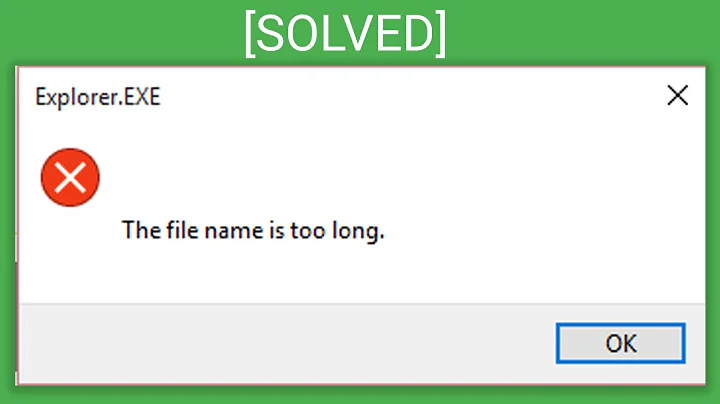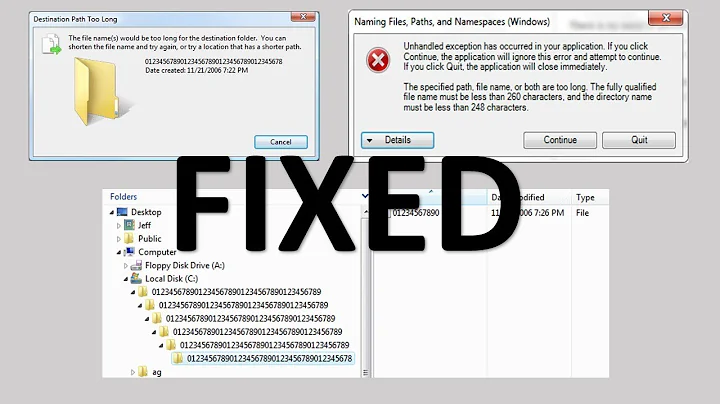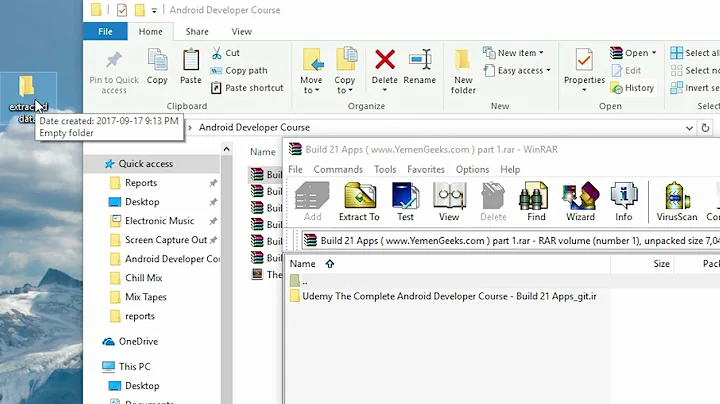How to deal with files with a name longer than 259 characters?
Solution 1
.NET 4.6.2 Solution
Use the \\?\C:\Verrrrrrrrrrrry long path syntax as described here.
.NET Core Solution
It just works because the framework adds the long path syntax for you.
Pre .NET 4.6.2 Solution
Also use the long path syntax and the Unicode version of the Win32 API function with P/Invoke. From Naming Files, Paths, and Namespaces:
The Windows API has many functions that also have Unicode versions to permit an extended-length path for a maximum total path length of 32,767 characters. This type of path is composed of components separated by backslashes, each up to the value returned in the lpMaximumComponentLength parameter of the GetVolumeInformation function (this value is commonly 255 characters). To specify an extended-length path, use the
\\?\prefix. For example,\\?\D:\very long path.
Reading this Microsoft Support page might also be interesting.
A very extensive explanation in Long Paths in .NET by Kim Hamilton at the BCL Team blog lists a few hitches in handling these paths which he claims are the reason this syntax is still not supported in .NET directly:
There are several reasons we were reluctant to add long paths in the past, and why we’re still careful about it <...>.
<...> the
\\?\prefix not only enables long paths; it causes the path to be passed to the file system with minimal modification by the Windows APIs. A consequence is that\\?\turns off file name normalization performed by Windows APIs, including removing trailing spaces, expanding ‘.’ and ‘..’, converting relative paths into full paths, and so on.<...><...> Long paths with the
\\?\prefix can be used in most of the file-related Windows APIs, but not all Windows APIs. For example, LoadLibrary<...> fails if the file name is longer than MAX_PATH. <...> There are similar examples throughout the Windows APIs; some workarounds exist, but they are on a case-by-case basis.Another factor <...> is compatibility with other Windows-based applications and the Windows shell itself <...>
Because this problem is becoming increasingly common <...> there are efforts throughout Microsoft to address it. In fact, as a timely Vista plug, you’ll notice a couple of changes that reduce the chance of hitting the MAX_PATH limit: many of the special folder names have shortened and, more interestingly, the shell is using an auto-path shrinking feature <...> to attempt to squeeze them into 260 characters.
Warning: You might need to call the Windows APIs directly, since I think the .NET Framework might not support this kind of path syntax.
Solution 2
I created my own LongFile and LongDirectory classes to solve that issue. I use it whenever I normally would use System.IO.File.
There might be optimizations etc on it but its been working nicely for years now.
public static class LongFile
{
private const int MAX_PATH = 260;
public static bool Exists(string path)
{
if (path.Length < MAX_PATH) return System.IO.File.Exists(path);
var attr = NativeMethods.GetFileAttributesW(GetWin32LongPath(path));
return (attr != NativeMethods.INVALID_FILE_ATTRIBUTES && ((attr & NativeMethods.FILE_ATTRIBUTE_ARCHIVE) == NativeMethods.FILE_ATTRIBUTE_ARCHIVE));
}
public static void Delete(string path)
{
if (path.Length < MAX_PATH) System.IO.File.Delete(path);
else
{
bool ok = NativeMethods.DeleteFileW(GetWin32LongPath(path));
if (!ok) ThrowWin32Exception();
}
}
public static void AppendAllText(string path, string contents)
{
AppendAllText(path, contents, Encoding.Default);
}
public static void AppendAllText(string path, string contents, Encoding encoding)
{
if (path.Length < MAX_PATH)
{
System.IO.File.AppendAllText(path, contents, encoding);
}
else
{
var fileHandle = CreateFileForAppend(GetWin32LongPath(path));
using (var fs = new System.IO.FileStream(fileHandle, System.IO.FileAccess.Write))
{
var bytes = encoding.GetBytes(contents);
fs.Position = fs.Length;
fs.Write(bytes, 0, bytes.Length);
}
}
}
public static void WriteAllText(string path, string contents)
{
WriteAllText(path, contents, Encoding.Default);
}
public static void WriteAllText(string path, string contents, Encoding encoding)
{
if (path.Length < MAX_PATH)
{
System.IO.File.WriteAllText(path, contents, encoding);
}
else
{
var fileHandle = CreateFileForWrite(GetWin32LongPath(path));
using (var fs = new System.IO.FileStream(fileHandle, System.IO.FileAccess.Write))
{
var bytes = encoding.GetBytes(contents);
fs.Write(bytes, 0, bytes.Length);
}
}
}
public static void WriteAllBytes(string path, byte[] bytes)
{
if (path.Length < MAX_PATH)
{
System.IO.File.WriteAllBytes(path, bytes);
}
else
{
var fileHandle = CreateFileForWrite(GetWin32LongPath(path));
using (var fs = new System.IO.FileStream(fileHandle, System.IO.FileAccess.Write))
{
fs.Write(bytes, 0, bytes.Length);
}
}
}
public static void Copy(string sourceFileName, string destFileName)
{
Copy(sourceFileName, destFileName, false);
}
public static void Copy(string sourceFileName, string destFileName, bool overwrite)
{
if (sourceFileName.Length < MAX_PATH && (destFileName.Length < MAX_PATH)) System.IO.File.Copy(sourceFileName, destFileName, overwrite);
else
{
var ok = NativeMethods.CopyFileW(GetWin32LongPath(sourceFileName), GetWin32LongPath(destFileName), !overwrite);
if (!ok) ThrowWin32Exception();
}
}
public static void Move(string sourceFileName, string destFileName)
{
if (sourceFileName.Length < MAX_PATH && (destFileName.Length < MAX_PATH)) System.IO.File.Move(sourceFileName, destFileName);
else
{
var ok = NativeMethods.MoveFileW(GetWin32LongPath(sourceFileName), GetWin32LongPath(destFileName));
if (!ok) ThrowWin32Exception();
}
}
public static string ReadAllText(string path)
{
return ReadAllText(path, Encoding.Default);
}
public static string ReadAllText(string path, Encoding encoding)
{
if (path.Length < MAX_PATH) { return System.IO.File.ReadAllText(path, encoding); }
var fileHandle = GetFileHandle(GetWin32LongPath(path));
using (var fs = new System.IO.FileStream(fileHandle, System.IO.FileAccess.Read))
{
var data = new byte[fs.Length];
fs.Read(data, 0, data.Length);
return encoding.GetString(data);
}
}
public static string[] ReadAllLines(string path)
{
return ReadAllLines(path, Encoding.Default);
}
public static string[] ReadAllLines(string path, Encoding encoding)
{
if (path.Length < MAX_PATH) { return System.IO.File.ReadAllLines(path, encoding); }
var fileHandle = GetFileHandle(GetWin32LongPath(path));
using (var fs = new System.IO.FileStream(fileHandle, System.IO.FileAccess.Read))
{
var data = new byte[fs.Length];
fs.Read(data, 0, data.Length);
var str = encoding.GetString(data);
if (str.Contains("\r")) return str.Split(new[] { "\r\n" }, StringSplitOptions.None);
return str.Split('\n');
}
}
public static byte[] ReadAllBytes(string path)
{
if (path.Length < MAX_PATH) return System.IO.File.ReadAllBytes(path);
var fileHandle = GetFileHandle(GetWin32LongPath(path));
using (var fs = new System.IO.FileStream(fileHandle, System.IO.FileAccess.Read))
{
var data = new byte[fs.Length];
fs.Read(data, 0, data.Length);
return data;
}
}
public static void SetAttributes(string path, FileAttributes attributes)
{
if (path.Length < MAX_PATH)
{
System.IO.File.SetAttributes(path, attributes);
}
else
{
var longFilename = GetWin32LongPath(path);
NativeMethods.SetFileAttributesW(longFilename, (int)attributes);
}
}
#region Helper methods
private static SafeFileHandle CreateFileForWrite(string filename)
{
if (filename.Length >= MAX_PATH) filename = GetWin32LongPath(filename);
SafeFileHandle hfile = NativeMethods.CreateFile(filename, (int)NativeMethods.FILE_GENERIC_WRITE, NativeMethods.FILE_SHARE_NONE, IntPtr.Zero, NativeMethods.CREATE_ALWAYS, 0, IntPtr.Zero);
if (hfile.IsInvalid) ThrowWin32Exception();
return hfile;
}
private static SafeFileHandle CreateFileForAppend(string filename)
{
if (filename.Length >= MAX_PATH) filename = GetWin32LongPath(filename);
SafeFileHandle hfile = NativeMethods.CreateFile(filename, (int)NativeMethods.FILE_GENERIC_WRITE, NativeMethods.FILE_SHARE_NONE, IntPtr.Zero, NativeMethods.CREATE_NEW, 0, IntPtr.Zero);
if (hfile.IsInvalid)
{
hfile = NativeMethods.CreateFile(filename, (int)NativeMethods.FILE_GENERIC_WRITE, NativeMethods.FILE_SHARE_NONE, IntPtr.Zero, NativeMethods.OPEN_EXISTING, 0, IntPtr.Zero);
if (hfile.IsInvalid) ThrowWin32Exception();
}
return hfile;
}
internal static SafeFileHandle GetFileHandle(string filename)
{
if (filename.Length >= MAX_PATH) filename = GetWin32LongPath(filename);
SafeFileHandle hfile = NativeMethods.CreateFile(filename, (int)NativeMethods.FILE_GENERIC_READ, NativeMethods.FILE_SHARE_READ, IntPtr.Zero, NativeMethods.OPEN_EXISTING, 0, IntPtr.Zero);
if (hfile.IsInvalid) ThrowWin32Exception();
return hfile;
}
internal static SafeFileHandle GetFileHandleWithWrite(string filename)
{
if (filename.Length >= MAX_PATH) filename = GetWin32LongPath(filename);
SafeFileHandle hfile = NativeMethods.CreateFile(filename, (int)(NativeMethods.FILE_GENERIC_READ | NativeMethods.FILE_GENERIC_WRITE | NativeMethods.FILE_WRITE_ATTRIBUTES), NativeMethods.FILE_SHARE_NONE, IntPtr.Zero, NativeMethods.OPEN_EXISTING, 0, IntPtr.Zero);
if (hfile.IsInvalid) ThrowWin32Exception();
return hfile;
}
public static System.IO.FileStream GetFileStream(string filename, FileAccess access = FileAccess.Read)
{
var longFilename = GetWin32LongPath(filename);
SafeFileHandle hfile;
if (access == FileAccess.Write)
{
hfile = NativeMethods.CreateFile(longFilename, (int)(NativeMethods.FILE_GENERIC_READ | NativeMethods.FILE_GENERIC_WRITE | NativeMethods.FILE_WRITE_ATTRIBUTES), NativeMethods.FILE_SHARE_NONE, IntPtr.Zero, NativeMethods.OPEN_EXISTING, 0, IntPtr.Zero);
}
else
{
hfile = NativeMethods.CreateFile(longFilename, (int)NativeMethods.FILE_GENERIC_READ, NativeMethods.FILE_SHARE_READ, IntPtr.Zero, NativeMethods.OPEN_EXISTING, 0, IntPtr.Zero);
}
if (hfile.IsInvalid) ThrowWin32Exception();
return new System.IO.FileStream(hfile, access);
}
[DebuggerStepThrough]
public static void ThrowWin32Exception()
{
int code = Marshal.GetLastWin32Error();
if (code != 0)
{
throw new System.ComponentModel.Win32Exception(code);
}
}
public static string GetWin32LongPath(string path)
{
if (path.StartsWith(@"\\?\")) return path;
if (path.StartsWith("\\"))
{
path = @"\\?\UNC\" + path.Substring(2);
}
else if (path.Contains(":"))
{
path = @"\\?\" + path;
}
else
{
var currdir = Environment.CurrentDirectory;
path = Combine(currdir, path);
while (path.Contains("\\.\\")) path = path.Replace("\\.\\", "\\");
path = @"\\?\" + path;
}
return path.TrimEnd('.'); ;
}
private static string Combine(string path1, string path2)
{
return path1.TrimEnd('\\') + "\\" + path2.TrimStart('\\').TrimEnd('.'); ;
}
#endregion
public static void SetCreationTime(string path, DateTime creationTime)
{
long cTime = 0;
long aTime = 0;
long wTime = 0;
using (var handle = GetFileHandleWithWrite(path))
{
NativeMethods.GetFileTime(handle, ref cTime, ref aTime, ref wTime);
var fileTime = creationTime.ToFileTimeUtc();
if (!NativeMethods.SetFileTime(handle, ref fileTime, ref aTime, ref wTime))
{
throw new Win32Exception();
}
}
}
public static void SetLastAccessTime(string path, DateTime lastAccessTime)
{
long cTime = 0;
long aTime = 0;
long wTime = 0;
using (var handle = GetFileHandleWithWrite(path))
{
NativeMethods.GetFileTime(handle, ref cTime, ref aTime, ref wTime);
var fileTime = lastAccessTime.ToFileTimeUtc();
if (!NativeMethods.SetFileTime(handle, ref cTime, ref fileTime, ref wTime))
{
throw new Win32Exception();
}
}
}
public static void SetLastWriteTime(string path, DateTime lastWriteTime)
{
long cTime = 0;
long aTime = 0;
long wTime = 0;
using (var handle = GetFileHandleWithWrite(path))
{
NativeMethods.GetFileTime(handle, ref cTime, ref aTime, ref wTime);
var fileTime = lastWriteTime.ToFileTimeUtc();
if (!NativeMethods.SetFileTime(handle, ref cTime, ref aTime, ref fileTime))
{
throw new Win32Exception();
}
}
}
public static DateTime GetLastWriteTime(string path)
{
long cTime = 0;
long aTime = 0;
long wTime = 0;
using (var handle = GetFileHandleWithWrite(path))
{
NativeMethods.GetFileTime(handle, ref cTime, ref aTime, ref wTime);
return DateTime.FromFileTimeUtc(wTime);
}
}
}
And a corresponding LongDirectory:
public class LongDirectory
{
private const int MAX_PATH = 260;
public static void CreateDirectory(string path)
{
if (string.IsNullOrWhiteSpace(path)) return;
if (path.Length < MAX_PATH)
{
System.IO.Directory.CreateDirectory(path);
}
else
{
var paths = GetAllPathsFromPath(GetWin32LongPath(path));
foreach (var item in paths)
{
if (!LongExists(item))
{
var ok = NativeMethods.CreateDirectory(item, IntPtr.Zero);
if (!ok)
{
ThrowWin32Exception();
}
}
}
}
}
public static void Delete(string path)
{
Delete(path, false);
}
public static void Delete(string path, bool recursive)
{
if (path.Length < MAX_PATH && !recursive)
{
System.IO.Directory.Delete(path, false);
}
else
{
if (!recursive)
{
bool ok = NativeMethods.RemoveDirectory(GetWin32LongPath(path));
if (!ok) ThrowWin32Exception();
}
else
{
DeleteDirectories(new string[] { GetWin32LongPath(path) });
}
}
}
private static void DeleteDirectories(string[] directories)
{
foreach (string directory in directories)
{
string[] files = LongDirectory.GetFiles(directory, null, System.IO.SearchOption.TopDirectoryOnly);
foreach (string file in files)
{
LongFile.Delete(file);
}
directories = LongDirectory.GetDirectories(directory, null, System.IO.SearchOption.TopDirectoryOnly);
DeleteDirectories(directories);
bool ok = NativeMethods.RemoveDirectory(GetWin32LongPath(directory));
if (!ok) ThrowWin32Exception();
}
}
public static bool Exists(string path)
{
if (path.Length < MAX_PATH) return System.IO.Directory.Exists(path);
return LongExists(GetWin32LongPath(path));
}
private static bool LongExists(string path)
{
var attr = NativeMethods.GetFileAttributesW(path);
return (attr != NativeMethods.INVALID_FILE_ATTRIBUTES && ((attr & NativeMethods.FILE_ATTRIBUTE_DIRECTORY) == NativeMethods.FILE_ATTRIBUTE_DIRECTORY));
}
public static string[] GetDirectories(string path)
{
return GetDirectories(path, null, SearchOption.TopDirectoryOnly);
}
public static string[] GetDirectories(string path, string searchPattern)
{
return GetDirectories(path, searchPattern, SearchOption.TopDirectoryOnly);
}
public static string[] GetDirectories(string path, string searchPattern, System.IO.SearchOption searchOption)
{
searchPattern = searchPattern ?? "*";
var dirs = new List<string>();
InternalGetDirectories(path, searchPattern, searchOption, ref dirs);
return dirs.ToArray();
}
private static void InternalGetDirectories(string path, string searchPattern, System.IO.SearchOption searchOption, ref List<string> dirs)
{
NativeMethods.WIN32_FIND_DATA findData;
IntPtr findHandle = NativeMethods.FindFirstFile(System.IO.Path.Combine(GetWin32LongPath(path), searchPattern), out findData);
try
{
if (findHandle != new IntPtr(-1))
{
do
{
if ((findData.dwFileAttributes & System.IO.FileAttributes.Directory) != 0)
{
if (findData.cFileName != "." && findData.cFileName != "..")
{
string subdirectory = System.IO.Path.Combine(path, findData.cFileName);
dirs.Add(GetCleanPath(subdirectory));
if (searchOption == SearchOption.AllDirectories)
{
InternalGetDirectories(subdirectory, searchPattern, searchOption, ref dirs);
}
}
}
} while (NativeMethods.FindNextFile(findHandle, out findData));
NativeMethods.FindClose(findHandle);
}
else
{
ThrowWin32Exception();
}
}
catch (Exception)
{
NativeMethods.FindClose(findHandle);
throw;
}
}
public static string[] GetFiles(string path)
{
return GetFiles(path, null, SearchOption.TopDirectoryOnly);
}
public static string[] GetFiles(string path, string searchPattern)
{
return GetFiles(path, searchPattern, SearchOption.TopDirectoryOnly);
}
public static string[] GetFiles(string path, string searchPattern, System.IO.SearchOption searchOption)
{
searchPattern = searchPattern ?? "*";
var files = new List<string>();
var dirs = new List<string> { path };
if (searchOption == SearchOption.AllDirectories)
{
//Add all the subpaths
dirs.AddRange(LongDirectory.GetDirectories(path, null, SearchOption.AllDirectories));
}
foreach (var dir in dirs)
{
NativeMethods.WIN32_FIND_DATA findData;
IntPtr findHandle = NativeMethods.FindFirstFile(System.IO.Path.Combine(GetWin32LongPath(dir), searchPattern), out findData);
try
{
if (findHandle != new IntPtr(-1))
{
do
{
if ((findData.dwFileAttributes & System.IO.FileAttributes.Directory) == 0)
{
string filename = System.IO.Path.Combine(dir, findData.cFileName);
files.Add(GetCleanPath(filename));
}
} while (NativeMethods.FindNextFile(findHandle, out findData));
NativeMethods.FindClose(findHandle);
}
}
catch (Exception)
{
NativeMethods.FindClose(findHandle);
throw;
}
}
return files.ToArray();
}
public static void Move(string sourceDirName, string destDirName)
{
if (sourceDirName.Length < MAX_PATH || destDirName.Length < MAX_PATH)
{
System.IO.Directory.Move(sourceDirName, destDirName);
}
else
{
var ok = NativeMethods.MoveFileW(GetWin32LongPath(sourceDirName), GetWin32LongPath(destDirName));
if (!ok) ThrowWin32Exception();
}
}
#region Helper methods
[DebuggerStepThrough]
public static void ThrowWin32Exception()
{
int code = Marshal.GetLastWin32Error();
if (code != 0)
{
throw new System.ComponentModel.Win32Exception(code);
}
}
public static string GetWin32LongPath(string path)
{
if (path.StartsWith(@"\\?\")) return path;
var newpath = path;
if (newpath.StartsWith("\\"))
{
newpath = @"\\?\UNC\" + newpath.Substring(2);
}
else if (newpath.Contains(":"))
{
newpath = @"\\?\" + newpath;
}
else
{
var currdir = Environment.CurrentDirectory;
newpath = Combine(currdir, newpath);
while (newpath.Contains("\\.\\")) newpath = newpath.Replace("\\.\\", "\\");
newpath = @"\\?\" + newpath;
}
return newpath.TrimEnd('.');
}
private static string GetCleanPath(string path)
{
if (path.StartsWith(@"\\?\UNC\")) return @"\\" + path.Substring(8);
if (path.StartsWith(@"\\?\")) return path.Substring(4);
return path;
}
private static List<string> GetAllPathsFromPath(string path)
{
bool unc = false;
var prefix = @"\\?\";
if (path.StartsWith(prefix + @"UNC\"))
{
prefix += @"UNC\";
unc = true;
}
var split = path.Split('\\');
int i = unc ? 6 : 4;
var list = new List<string>();
var txt = "";
for (int a = 0; a < i; a++)
{
if (a > 0) txt += "\\";
txt += split[a];
}
for (; i < split.Length; i++)
{
txt = Combine(txt, split[i]);
list.Add(txt);
}
return list;
}
private static string Combine(string path1, string path2)
{
return path1.TrimEnd('\\') + "\\" + path2.TrimStart('\\').TrimEnd('.');
}
#endregion
}
NativeMethods:
internal static class NativeMethods
{
internal const int FILE_ATTRIBUTE_ARCHIVE = 0x20;
internal const int INVALID_FILE_ATTRIBUTES = -1;
internal const int FILE_READ_DATA = 0x0001;
internal const int FILE_WRITE_DATA = 0x0002;
internal const int FILE_APPEND_DATA = 0x0004;
internal const int FILE_READ_EA = 0x0008;
internal const int FILE_WRITE_EA = 0x0010;
internal const int FILE_READ_ATTRIBUTES = 0x0080;
internal const int FILE_WRITE_ATTRIBUTES = 0x0100;
internal const int FILE_SHARE_NONE = 0x00000000;
internal const int FILE_SHARE_READ = 0x00000001;
internal const int FILE_ATTRIBUTE_DIRECTORY = 0x10;
internal const long FILE_GENERIC_WRITE = STANDARD_RIGHTS_WRITE |
FILE_WRITE_DATA |
FILE_WRITE_ATTRIBUTES |
FILE_WRITE_EA |
FILE_APPEND_DATA |
SYNCHRONIZE;
internal const long FILE_GENERIC_READ = STANDARD_RIGHTS_READ |
FILE_READ_DATA |
FILE_READ_ATTRIBUTES |
FILE_READ_EA |
SYNCHRONIZE;
internal const long READ_CONTROL = 0x00020000L;
internal const long STANDARD_RIGHTS_READ = READ_CONTROL;
internal const long STANDARD_RIGHTS_WRITE = READ_CONTROL;
internal const long SYNCHRONIZE = 0x00100000L;
internal const int CREATE_NEW = 1;
internal const int CREATE_ALWAYS = 2;
internal const int OPEN_EXISTING = 3;
internal const int MAX_PATH = 260;
internal const int MAX_ALTERNATE = 14;
[StructLayout(LayoutKind.Sequential, CharSet = CharSet.Unicode)]
internal struct WIN32_FIND_DATA
{
public System.IO.FileAttributes dwFileAttributes;
public FILETIME ftCreationTime;
public FILETIME ftLastAccessTime;
public FILETIME ftLastWriteTime;
public uint nFileSizeHigh; //changed all to uint, otherwise you run into unexpected overflow
public uint nFileSizeLow; //|
public uint dwReserved0; //|
public uint dwReserved1; //v
[MarshalAs(UnmanagedType.ByValTStr, SizeConst = MAX_PATH)]
public string cFileName;
[MarshalAs(UnmanagedType.ByValTStr, SizeConst = MAX_ALTERNATE)]
public string cAlternate;
}
[DllImport("kernel32.dll", CharSet = CharSet.Unicode, SetLastError = true)]
internal static extern SafeFileHandle CreateFile(string lpFileName, int dwDesiredAccess, int dwShareMode, IntPtr lpSecurityAttributes, int dwCreationDisposition, int dwFlagsAndAttributes, IntPtr hTemplateFile);
[DllImport("kernel32.dll", CharSet = CharSet.Unicode, SetLastError = true)]
internal static extern bool CopyFileW(string lpExistingFileName, string lpNewFileName, bool bFailIfExists);
[DllImport("kernel32.dll", CharSet = CharSet.Unicode, SetLastError = true)]
internal static extern int GetFileAttributesW(string lpFileName);
[DllImport("kernel32.dll", CharSet = CharSet.Unicode, SetLastError = true)]
internal static extern bool DeleteFileW(string lpFileName);
[DllImport("kernel32.dll", CharSet = CharSet.Unicode, SetLastError = true)]
internal static extern bool MoveFileW(string lpExistingFileName, string lpNewFileName);
[DllImport("kernel32.dll", CharSet = CharSet.Unicode, SetLastError = true)]
internal static extern bool SetFileTime(SafeFileHandle hFile, ref long lpCreationTime, ref long lpLastAccessTime, ref long lpLastWriteTime);
[DllImport("kernel32.dll", CharSet = CharSet.Unicode, SetLastError = true)]
internal static extern bool GetFileTime(SafeFileHandle hFile, ref long lpCreationTime, ref long lpLastAccessTime, ref long lpLastWriteTime);
[DllImport("kernel32", CharSet = CharSet.Unicode, SetLastError = true)]
internal static extern IntPtr FindFirstFile(string lpFileName, out WIN32_FIND_DATA lpFindFileData);
[DllImport("kernel32", CharSet = CharSet.Unicode, SetLastError = true)]
internal static extern bool FindNextFile(IntPtr hFindFile, out WIN32_FIND_DATA lpFindFileData);
[DllImport("kernel32.dll", CharSet = CharSet.Unicode, SetLastError = true)]
internal static extern bool FindClose(IntPtr hFindFile);
[DllImport("kernel32.dll", CharSet = CharSet.Unicode, SetLastError = true)]
internal static extern bool RemoveDirectory(string path);
[DllImport("kernel32.dll", CharSet = CharSet.Unicode, SetLastError = true)]
internal static extern bool CreateDirectory(string lpPathName, IntPtr lpSecurityAttributes);
[DllImport("kernel32.dll", CharSet = CharSet.Unicode, SetLastError = true)]
internal static extern int SetFileAttributesW(string lpFileName, int fileAttributes);
}
Solution 3
You could try the Delimon library, its a .NET Framework 4 based library on Microsoft TechNet for overcoming the long filenames problem:
Delimon.Win32.IO Library (V4.0).
It has its own versions of key methods from System.IO. For example, you would replace:
System.IO.Directory.GetFiles
with
Delimon.Win32.IO.Directory.GetFiles
which will let you handle long files and folders.
From the website:
Delimon.Win32.IO replaces basic file functions of System.IO and supports File & Folder names up to up to 32,767 Characters.
This Library is written on .NET Framework 4.0 and can be used either on x86 & x64 systems. The File & Folder limitations of the standard System.IO namespace can work with files that have 260 characters in a filename and 240 characters in a folder name (MAX_PATH is usually configured as 260 characters). Typically you run into the System.IO.PathTooLongException error with the Standard .NET Library.
Solution 4
.NET Core now supports long path names without needing extended syntax.
Solution 5
I ran into this problem once with an application that I was writing. When I was getting close to hitting the 260 character limit, I would map a network drive, on the fly, to some segment of the full path, thus cutting the length of the full path + file-name down significantly. It's not really an elegant solution, but it got the job done.
Related videos on Youtube
Arseni Mourzenko
Developer, architect, project manager, tester, and active DevOps supporter, I'm studying, observing and advising companies which have an important risk to fail their IT-related projects. I specialize in quality and productivity. After six years of freelancing, I worked for several companies, including Tata Consultancy Services. Today, I'm a happy member of Finaxys. I mostly work with Linux, Python, and Node.js, as well as the Microsoft stack. Outside information technology, I'm interested by photography. I'm mostly active on SE.SE, and also maintain my blog. If you want to contact me, my email is [email protected]. Feel free to drop me a note about any development-related discussions. If you live in Paris or want to visit Paris, you're very welcome to contact me too.
Updated on December 01, 2020Comments
-
Arseni Mourzenko over 3 years
I'm working on an application which walks through every file in some directories and does some actions with those files. Among others, I must retrieve the file size and the date when this file was modified.
Some file full names (directory + file name) being too long, I couldn't use .NET Framework
FileInfo, which is limited toMAX_PATH(260 characters). Many web sources advised to use native Win32 functions through P/Invoke to access the files whose names are too long.Currently, the exactly same problem seems to arise with Win32 functions. For example,
GetFileAttributesEx(kernel32.dll) fails with Win32 error 3 ERROR_PATH_NOT_FOUND for the path of 270 bytes.The very same file can successfully be opened from Notepad2 and successfully displayed with Windows Explorer (but Visual Studio 2010 for example fails to open it because of the 259 characters limit¹).
What can I do to be able to access a file when the file path is 270 characters long?
Notes:
Removing or ignoring files with the file path length longer than 259 characters is not a solution.
I'm looking for Unicode-compatible solutions only.
The application will run under Windows 2008/Vista or later with .NET Framework 4 installed.
¹ Surprisingly, Microsoft Word 2007 fails, complaining that "the floppy disk is too small" on a computer which don't have any floppy drive, or that "RAM memory is low" when there is 4 GB of RAM left, or finally that "antivirus software [...] needs to be updated". Will they stop one day displaying such stupidly meaningless errors at least in such key products as Microsoft Office?
-
Grant Thomas about 13 yearsI believe, even these days, that every filename maps to an 8.3 format filename, can't you use that? en.wikipedia.org/wiki/…
-
 David Heffernan about 13 yearsEven an 8.3 format filename can exceed 260 characters, you just need deep folder nesting.
David Heffernan about 13 yearsEven an 8.3 format filename can exceed 260 characters, you just need deep folder nesting. -
Bacon Bits about 8 yearsNote that you can (and may want to since it adds I/O overhead) disable 8.3 name creation, so, no, you can't be sure that an 8.3 exists. See
fsutil.exe 8dot3name.
-
user541686 about 13 yearsYour quote is correct but a bit misleading: This limitation has nothing to do with the ANSI version (it's also limited in the Unicode version).
-
lunixbochs about 13 yearsit very clearly states you need to use both the Unicode version and the prefix to extend the limit.
-
 Jamie Penney about 13 yearsYeah, 3.5 didn't support this kind of path. I doubt 4.0 added it.
Jamie Penney about 13 yearsYeah, 3.5 didn't support this kind of path. I doubt 4.0 added it. -
Spiralis almost 13 yearsIf you need to access a server-share with long path you need to write it like this: \\?\UNC\Server\Share, in other words adding \\?\UNC\ as a prefix. More on this: installsetupconfig.com/win32programming/windowsfileapis4_2.html
-
Cody Gray almost 10 yearsYes, you will need to P/Invoke the Win32 API functions and call them directly from a .NET application. .NET's internal plumbing (specifically, a
PathHelperclass) validates the path and throws an exception if it is more thanMAX_PATH(260) characters. -
user541686 about 8 years@AmaniKilumanga: Then your path is basically a 6000-word essay and the system can't handle it.
-
Arseni Mourzenko over 7 yearsStackOverflow is not a good place to share source code of libraries. If you want it to actually be used by other developers, I believe you should (1) publish it on GitHub or a similar service, (2) include unit tests, and (3) publish it as a NuGet package; optionally, you should consider adding documentation if you want to encourage other people to contribute to your library. You may then edit this answer to explain what you did and how this library answers the original question (because it does!), and to include the corresponding links to GitHub and NuGet.
-
Wolf5 over 7 yearsThis is just a few classes from a larger project I have on my personal TFS repository (visualstudio.com). Thought I share it as I all to often see software issues with missing support for long paths (even TFS 2013 fails if you go past 259 in length...). But yes. Might do something like that in the future (for example if this post gets lots of votes :) ).
-
denahiro over 6 yearsThis response is no longer completely valid. As of .Net 4.6.2 the file APIs can handle long path name syntax and using P/Invoke is no longer necessary (blogs.msdn.microsoft.com/jeremykuhne/2016/06/21/…).
-
user541686 over 6 years@denahiro: Perhaps you can take the liberty to edit it... as did the previous person who put it there (I did not)...
-
Mark G over 5 yearsThere is also AlphaFS library for paths exceeding 260 characters.
-
Alex over 4 yearsThis solution works for me, but in InternalGetDirectories function, the recursion doesn't work if AllDirectories option is selected and when the search pattern isn't found in subdirectories list. I had to replace the line ThrowWin32Exception(); by a sort of pre-search with "*" as pattern (code to long to be included here, but very similar to do code in the function).
-
fartwhif over 4 yearsTried ZetaLongPaths nuget/github project, copying files was producing corrupt files for some reason, trying this now. I think it also uses these pinvoke patterns, but you never know!
-
Tipx almost 4 yearsThanks for this sir, but just FYI, if the target path is relative ("..\Fu\Bar.txt") it won't work. I fixed it on my side by forcing it as absolute path.
-
 nmilcoff almost 4 yearsHey folks, if I may... How about UWP? What's the recommendation there?
nmilcoff almost 4 yearsHey folks, if I may... How about UWP? What's the recommendation there? -
dynamichael over 3 yearsYour links are broken, guys.
-
 google dev over 3 years
google dev over 3 yearsFileStreamstill needs extended syntax. -
jw_ over 3 yearsVery precise - \\?\ doesn't work on 4.6.1 but work on 4.6.2
-
user541686 over 3 years^Thanks to @denahiro for adding that to my answer :)
-
elle0087 over 3 yearsBEST SOLUTION!!
-
 John Foll about 2 yearsThanks for you source code!
John Foll about 2 yearsThanks for you source code! -
Kyriakos Xatzisavvas almost 2 yearsI've used this piece of code at least in three different projects this year. Supposedly changing to 4.6.2 and adding \\?\ prefix to the paths should be easier but some legacy projects dont allow that. Also its super convenient that all you have to do for this to work is to just change the File and Directory references to LongFile and LongDirectory, and just like that you're ready. Really thank you for this.





![[2020 FIX] - Cannot open the file because the file path is more than 260 characters - Windows 10/8/7](https://i.ytimg.com/vi/hXGxa4H4e4Y/hq720.jpg?sqp=-oaymwEcCNAFEJQDSFXyq4qpAw4IARUAAIhCGAFwAcABBg==&rs=AOn4CLCR0bugsr-f44EVZHKqQrO6cc5frQ)


